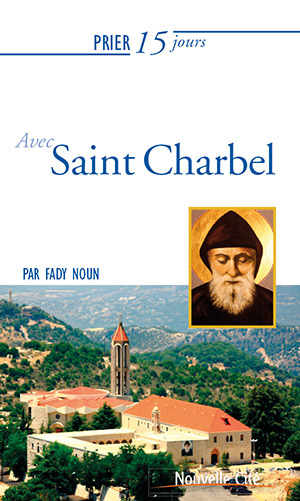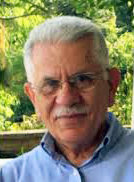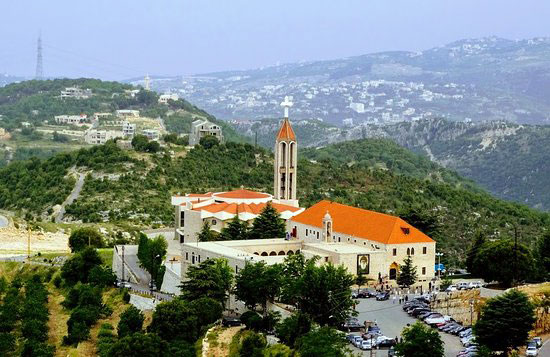Amazing Ways of an
Angelic Monk:
.
Saint Charbel of
Lebanon
.
By Fady Noun
This
is an English
translation of
a lightly
modified
excerpt from a
new book
written in
French by Fady
Noun,
entitled' Prier
15 Jours Avec
Saint Charbel,
(Praying
for 15 days
with Saint
Charbel).
Fady Noun is a
noted Lebanese
journalist,
author, and
member of the
People of God
community in
Lebanon.
Saint
Charbel
Makhlouf of
Lebanon (1828
- 1898), is
revered by
Christians and
Muslims as a
holy man of
God, who devoted
his life to
prayer and
intercession
as a Maronite
monk, and
later as a
hermit, at the
Monastery of
Saint Maron,
Aannaya,
Lebanon.
His
intercession
led to many
extraordinary
miracles,
healings, and
answered
prayers for
thousands of
people. The
crypt where
his mortal
remains are
kept is filled
with
innumerable
letters of
answered
prayers and
the walls are
lined with many
crutches
left by people
who were cured
through his
intercession.
Today,
thousands of
Christians and
Muslims come
to visit the
monastery and
pay their
respect at
Charbel's
tomb. And
many return
home with
thanksgiving
and spiritual
blessing.
The
book is
written as a
short
meditative
guide on the
spiritual life
of St.
Charbel, a
holy "monk who
behaved on
earth more
like an angel
than as man"
to quote his
religious
superior,
Abbot Antonios
Michmichani.
“For you has he commanded his angels to keep you in
all your ways”
– Psalm 91:11
In
introducing St
Charbel, we
suggested that
he must have
been led down
some
extraordinary
pathways
without ever
letting this
be apparent,
ways which his
superiors had
not thought to
record in
writing,
although it
seems
unthinkable
that they
would not have
noticed what
was happening.
There is,
however, one
account which
stands out –
the text of
the death
notice in the
convent
register
entered by his
superior,
abbot
Antonios
Michmichani.
Fr Antonios
spares himself
the trouble of
writing a long
commentary on
St Charbel’s
life by simply
pointing out
that “the work
he will do
after his
death” will
speak
eloquently
enough “of a
monk who
behaved on
earth more
like an angel
than a man”.
The stunning
precision of
this
prediction
was,
nevertheless,
to be expected
in the light
of the signs
and wonders
accomplished
in his
lifetime by
the saintly
monk.
We have only
sketches of
these
extraordinary
paths along
which he was
led. One of
his brother
monks relates
how once, when
St Charbel was
worshipping in
the church, he
seemed to be
“talking to
someone”.
Without solid
evidence
though, this
may have been
just an
impression. In
addition to
this, there
are several
other examples
describing a
profound
stillness
suggestive of
a deep state
of
contemplation
or
prayer.
According to
St Teresa of
Avila, this
could be
classed as one
or other state
of “ecstasy”
or “union with
God”, which
she could
speak about
with
discernment,
as a doctor of
the church.
But here too,
there is a
lack of real
evidence.
Charbel
absorbed in
prayer when
lightning and
fire filled
his hermitage
chapel
There is one
example,
however, of St
Charbel’s
state of
ecstasy when
he was in
contemplation.
It happened in
the winter.
During a
thunderstorm
which swept
through
Annaya,
lightning hit
the hermitage
chapel with a
great crash.
The explosion
shook the
walls and the
electrical
charge
produced a
smell of
burning which
almost
suffocated the
two hermits
sitting by the
hearth in the
kitchen. It
was so bad
they were on
the point of
fainting. When
they came to
their senses,
they rushed
into the
chapel and
were surprised
to find
Charbel on his
knees and
completely
absorbed in
prayer. This
was despite
the lightning
scorching the
altar cloth
and the
gold-embroidered
chasuble laid
on it. The
lightning must
have, at the
least, brushed
against the
saintly monk.
This incident
was without
doubt
extraordinary
and we are
entitled to
believe that
when the
lightning
struck the
chapel, the
saint was in
ecstasy. When
the monks from
the main
convent
arrived,
having rushed
down in the
dark to check
on the damage,
they
reproached him
for letting
the fire
damage the
altar cloth
and the
precious
chasuble. St
Charbel simply
replied “what
could I have
done? It was
all over in a
flash!”
Was he just
unruffled?
Should he have
been more
concerned
about his
companions? Or
was he trying
to divert
attention from
his ecstasy?
This is not
unlikely. In
any case, we
can be sure
that on that
night he was
protected in a
very special
way….
Supernatural
favours
Some other
incidents in
St Charbel’s
life could
also be
categorised as
“supernatural
favours” by
virtue of the
fact that his
contemporaries
could not
understand
them- for
example, one
day he was on
the road to
the coastal
town of
Amchit, which
is just below
Annaya, to
pray for the
healing of a
local
dignitary,
Gebrael
Sleimane, who
was on his
deathbed. At
the time
typhoid was
rife in the
area. Charbel
and his
companions
were
travelling
after dark, as
he refused to
leave before
nightfall,
not wanting
“to see or be
seen”. The
house he was
visiting was
not far from
Ghorfine and
his father’s
grave.
Suddenly, when
they were
still half way
to Amchit, he
stopped and
told the
others “There
is no point in
going on –
they’re saying
he has died”.
“They?” “Who
do you mean?”
they asked
him. But
Charbel was
silent. It was
only after
they had
insisted on
continuing
their journey
that he agreed
to go on,
dragging his
feet. As they
approached the
destination,
they were able
to hear in the
distance the
wails of the
mourners at
the dead man’s
house.
On asking them
the time of
the man’s
death, they
were told the
patient had
died at the
exact time
that St
Charbel had
stopped on the
road.
Ministry
of healing and
miracle-working
Of
course, we
have already
emphasised
that the gifts
of the Holy
Spirit are not
necessarily
signs of
sainthood, but
rather tools
for the
edification of
the faithful.
On the other
hand, the
regular
exercising of
a spiritual
gift can
become a
permanent
service to the
church, a
ministry. This
was definitely
the case with
St Charbel.
Early in his
monastic life
his superiors
had taken note
of his
extraordinary
ministry of
healing and
miracle-working.
They did not
deprive
themselves of
its use. St
Charbel prayed
on two
occasions, at
the request of
this superior,
for the
monastery’s
storage jars
of oil and
wheat to be
filled and his
prayers were
answered.
As for the
voices he
heard on the
road to
Amchit, in the
story of the
dying man, the
mystery
remains
complete.
Anyway, if
this was an
inner voice it
was not always
ignored by
others. On two
other
occasions, in
Michmich and
in Amchit, he
was warned
that the
person he was
being sent to
visit had
already died.
In both cases,
his companions
believed him
and spared
themselves the
trouble of
going. It has
to be said
that quite
often
influential
locals,
despairing of
being cured by
medical means,
would call on
the holy monk.
Once, when he
was back from
sitting for
weeks in
Kesrouane at
the bedside of
some children,
his brother
hermit asked
him what he
had seen on
the journey.
He gave the
famous reply:
“I went off
this way and
came back that
way”…
A
monk “drunk on
God”
That St
Charbel became
more and more
aware of being
led along
extraordinary
pathways is
without doubt.
“Drunk on
God”, as his
biographer
Paul Daher
described him,
he was also
constantly
looking out
for his
brothers and
sisters. We
can well
imagine him at
the hermitage
in the latter
period of his
life. He had
acquired
unparalleled
self-control
and inner
equilibrium.
As with St
Paul, it was
“no longer he
who was
living, but
Christ living
in him”
(Galatians 2
verse 20).
People would
flock from the
surrounding
villages to
attend his
masses on
Sundays and
weekdays. We
could say that
the Holy
Spirit was
constantly
whispering to
him to speak
and act as he
did. A worried
father (from
the village of
Kfar Baal,
near Jbeil)
came one day
to ask for
prayer for his
children and
was amazed to
be welcomed
with kindness
and
reassurance
before he had
even opened
his mouth to
explain.
In
another case,
when a father
came to Saint
Charbel to
solicit his
prayer for his
children, and
was about to
hurry home
with some
holy water,
Saint
Charbel
reassured him
that his
children were
out of danger
and he didn’t
have to hasten
so quickly.
Following the
example of
divine
Wisdom,
Charbel “found
his delight”
in giving joy
to his
brothers
(Proverbs 8 v
31).
[translation
by Nadia
Thompson,
London, UK]

Prier
15 Jours Avec
Saint Charbel
[Pray
15 days with Saint
Charbel] text in French

by
Fady Noun
|

